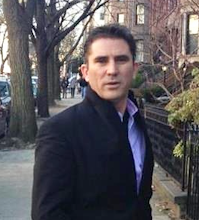James Franco at the IFC Center
Went to see James Franco's "The Broken Tower," his NYU film school's master's thesis, which he wrote, directed, and starred in, at the IFC Center on April 29th. The film is about the life and work of the gay American poet Hart Crane, who committed suicide at the age of 32. The film was shot in black and white on a hand-held video camera. It has a very small cast, including Franco's younger brother Dave (as the young Crane), his mother Betsy (as Crane's mother), and his actor friend Michael Shannon (as one of his lovers).
I was not terribly impressed with the cinematography, although it was nice to see black and white images of the Brooklyn Bridge. The screenplay and the dialogue did not impress me either. What was interesting were the sequences in which long, difficult poems were read aloud, without interruption, including Crane's "For the Marriage of Faustus and Helen." This is enough to make the film special, since this is very rarely done. It brought the poetry of Crane into the foreground, as opposed to his life. A film that was even more impressionistic, and even less concerned with telling his life story (in twelve chapters or "voyages"), would have been an even better film. Nevertheless, it was good to learn more about the life of this Modernist poet. I confess I only knew of his name, and had never read (or heard) his poetry before.
Here is a trailer that shows the only heterosexual love-making scene in the entire film, presumably in order to attract viewers who will not want to watch a film about Franco playing a gay poet with some relatively explicit gay love-making scenes.
After the screening Franco answered questions about the making of his film. I recorded some of his responses to questions from the audience, including his response to a final question about translating poetry into the medium of film. Although he sometimes struggled to be articulate, and did not look the audience in the eye (he was not a patch on Werner Herzog as a public speaker (see below on Herzog)), it was clear that he is serious about his film-making. I will give him credit for that.
There are a number of different magazine interviews with him about this film. Here is one in Slant.
One more thing. He is even better-looking in person than in his movies.
Franco is currently a Ph.D. student in English at Yale, but has not been seen much on campus this year. When he has been on campus, he has dressed like a homeless person – at least according to some Yale undergraduates.
I was not terribly impressed with the cinematography, although it was nice to see black and white images of the Brooklyn Bridge. The screenplay and the dialogue did not impress me either. What was interesting were the sequences in which long, difficult poems were read aloud, without interruption, including Crane's "For the Marriage of Faustus and Helen." This is enough to make the film special, since this is very rarely done. It brought the poetry of Crane into the foreground, as opposed to his life. A film that was even more impressionistic, and even less concerned with telling his life story (in twelve chapters or "voyages"), would have been an even better film. Nevertheless, it was good to learn more about the life of this Modernist poet. I confess I only knew of his name, and had never read (or heard) his poetry before.
Here is a trailer that shows the only heterosexual love-making scene in the entire film, presumably in order to attract viewers who will not want to watch a film about Franco playing a gay poet with some relatively explicit gay love-making scenes.
There are a number of different magazine interviews with him about this film. Here is one in Slant.
One more thing. He is even better-looking in person than in his movies.
Franco is currently a Ph.D. student in English at Yale, but has not been seen much on campus this year. When he has been on campus, he has dressed like a homeless person – at least according to some Yale undergraduates.



0 Comments:
Post a Comment
<< Home